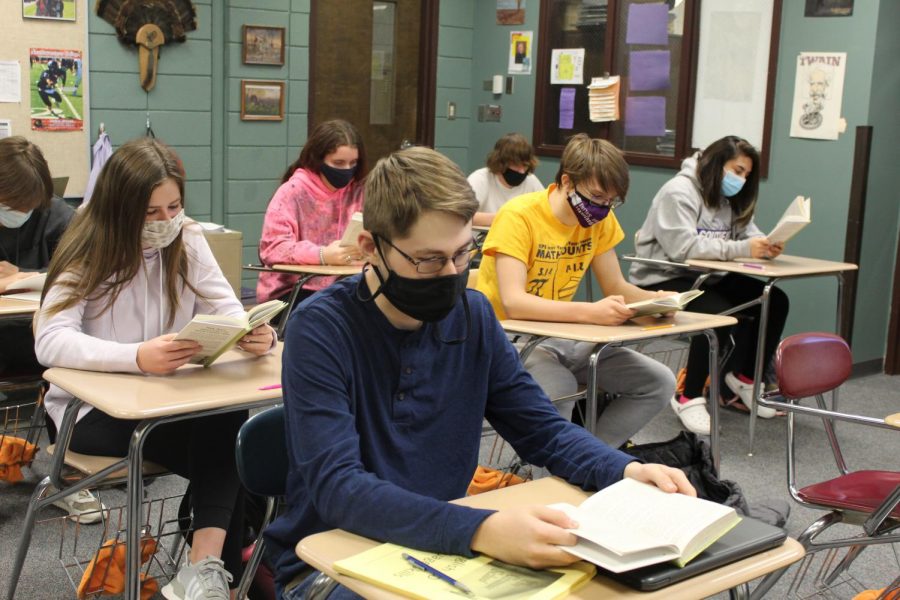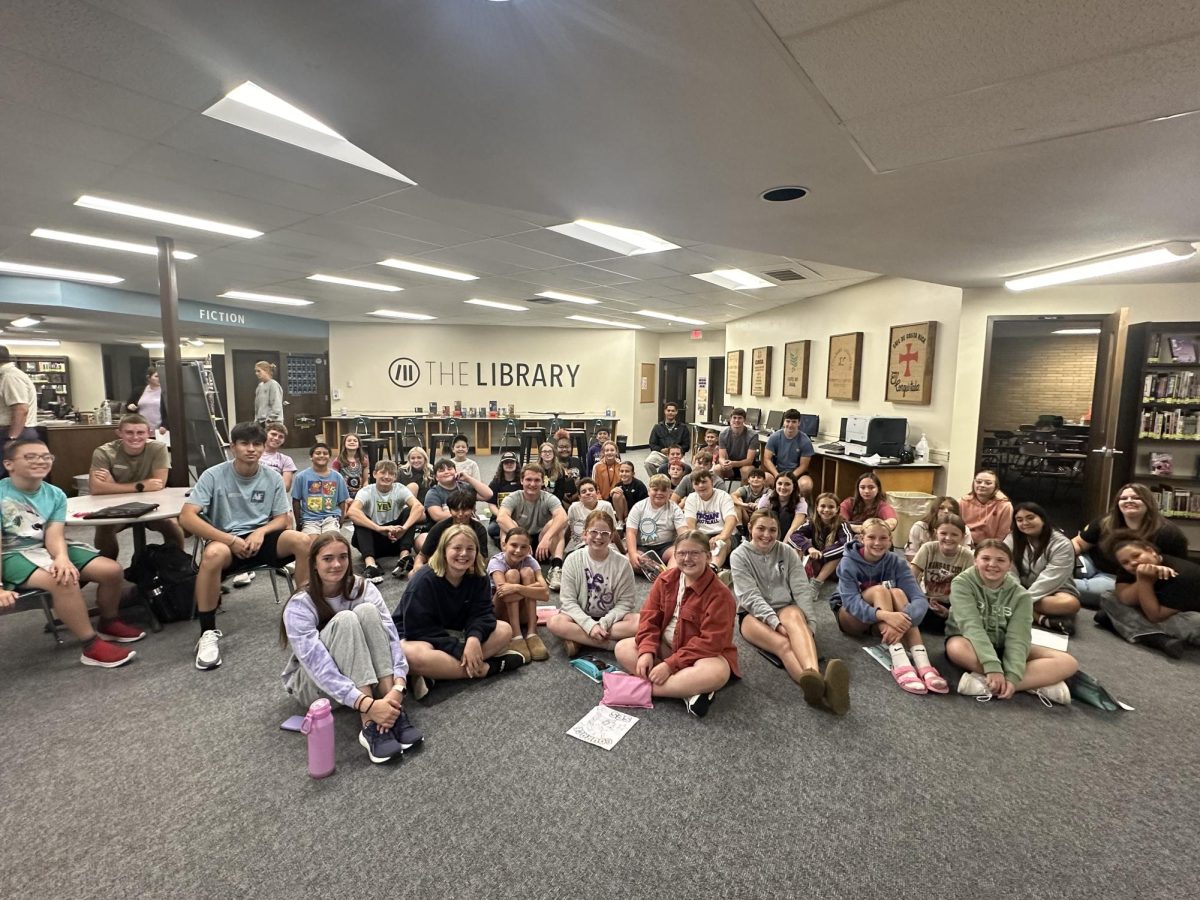Should Huckleberry Finn be taught in schools? Insight from students
January 8, 2021
Reading The Adventures of Huckleberry Finn in 2020 – Savannah Sutton
For many years, there has been a controversy on whether The Adventures of Huckleberry Finn by Mark Twain should be read in public schools or not. The novel was written after the Civil War, but it is set before the war, meaning slavery and racism were occurring in the South in the time period in which the story takes place. The novel is based on a young boy named Huckleberry Finn, who escapes his drunk and abusive father. Traveling down the Mississippi River, Huck encounters many obstacles trying to interfere with his journey. Along the way, he reunites with his friend from home, Jim, who is a runaway African American slave. The Adventures of Huckleberry Finn’s use of the n-word, informal language, and the idea of racism are all reasons why this book has a stigma behind it.
I want to be firm in stating that I believe Huck Finn should be taught in public schools. This novel uses many racial terms that shouldn’t be repeated when not in the right context, however, high school students should be mature enough to understand that these slang terms are inappropriate when not read in the novel. Mark Twain wrote this novel in the late nineteenth century, but he sets it before the Civil War when slavery was still legal. Before slavery was abolished, the United States had many slaves, most of which were African American. Because slavery no longer exists, students need to understand how life once was for many citizens long ago. Back then, African Americans were called the n-word on a daily basis. Times have changed, and we no longer use this word because of how disrespectful it is. Mark Twain only uses it to show the times he lived in.
Mark Twain was a realist writer who had the intentions of portraying reality through the speech patterns of his characters, especially Huck. Along with slavery, school also was an issue for some. Many people during these times were not given the opportunity to attend school. Jim, the runaway African American slave, does not speak like we do now. He has not been able to learn properly, therefore, he doesn’t speak properly. I believe that it is important for us to realize how lucky we are that we get to learn language in the correct manner. Huckleberry Finn is a young white boy, while Jim is an older African American slave. The bond between the two men grows more and more as they continue their journey to freedom. The fact that an African American man and a white boy are working together properly shows that the color of one’s skin should not ruin one’s relationship with another person. Huck gets faced with the issue of whether he should turn Jim in for being a runaway slave, or let him live his life as a free man. He soon realizes that Jim is a human, and not just a slave. He chooses to let him be free because he loves him as family. All humans have emotions and everyone’s emotions matter.
I had the opportunity to ask a few of my fellow classmates on what their opinions of this topic are. Sophomore Jace Vanamburg had this to say on the controversy surrounding The Adventures of Huckleberry Finn:
“I think that we should read Huck Finn in schools. One of the major controversies behind whether to read it or not is the use of the n word in the book. However, while I don’t believe that it is something that should be used and there is definitely a stigma behind it due to its use in the past such as the times of which it was written, I don’t believe we can get rid of the stigma behind the word by ignoring it. The book has great lessons of acceptance of everyone as during this time it would not be normal for a white boy to be with a black man. The book has great examples of acceptance and is very anti-racist, regardless of the words used in the book, which although is bad, were the words used at the time the book was written.”
Sophomore Eli Sawyers had a similar response. “I think it’s ok to be taught. I think it shows the importance of a good education. It does say the n word a lot, but that was just the slang back then. That is the history of our country, and I believe that it should be taught.”
Being that many schools are still exploring this novel, it should remain being taught in schools. We learn that the color of one’s skin shouldn’t affect your relationship with someone, the importance of history and how much it has changed, and how lucky we are to be able to have the ability to a proper education. Students learn important life skills by reading this novel. Just imagine how hard life used to look for many citizens out there and be thankful for the opportunities you get living as a free citizen in America.
Huckleberry Finn Should be Taught in Schools – Lindsey Dean
The novel The Adventures of Huckleberry Finn, by Mark Twain, is one of the most well known books. It was written in 1884 from the perspective of a thirteen year old boy named Huck. Huck grows up with an abusive dad, and he refuses to live with a civilized widow. The young boy fakes his death and runs away with a runaway slave, Jim. In the story, we hear of the adventures they go on. There are many raw stories with examples of friendship. In these stories, we are taught about the time period, and what society was like. It is important that Huckleberry Finn is taught in school, but many people disagree because of the many racial comments and conflict revolving around the character of color, Jim.
The first reason Huck Finn should be taught in school is that it teaches history. History is often really boring for students to learn. When students are able to learn history from a story based on true events, it is more engaging. Huck Finn shows what was really happening in the time period of the book. It is important that students learn topics from different angles so that they understand the material.
Another reason Huckleberry Finn should be taught in schools is because it tells of adventure. Huck Finn was a book that started the literary period of realism. Prior to realism was romanticism, so this book was an important turning point. It was unheard of to share such real true stories. Mark Twain was blazing a new trail, and students need to learn about this because his writings continue to influence our world today.
Huck Finn teaches important lessons of interratial friendship. In the time the book was written there was a lot of segregation. Huck Finn shows that things don’t have to be that way. Even in that time, a person of color and a white person were able to be friends. This teaches us a lesson today of how we should treat one another. Even though Huck would have gotten a lot of money, Huck doesn’t turn Jim in, so that can stay free. On the other hand, Jim also shows great kindness to Huck. When Huck’s dad passed away, Jim made sure that Huck didn’t see him dead on the ground because he knew it would be traumatizing for Huck. This shows that no matter what color of skin you have, each person is important, and a friendship is worth fighting for.
I asked Ava Mayginnes if she thought that Huck Finn should be taught in school. She said, “Yes, Huck Finn should be taught in school because it teaches valuable lessons that might not be in other books.” I asked the same question to Trinity Robb. She said, “It should be taught in school. The book teaches friendship between two people that are unlikely to be friends because of their race in that time period.”
A few reasons that people think Huck Finn shouldn’t be taught in school is because it deals with racial issues, and it contains poor language. These are valid points, however there isn’t anything in the book that a highschool student today hasn’t heard of before. The underlying life lessons are important enough to be taught even though there are controversial topics in the book.
To conclude, Huckleberry Finn should be taught in schools. This book helps to give students a new perspective on what life was like in the early 1800s. Students are able to learn history and other life lessons from the book. Students need to experience diversity in the books they read, and Huck Finn is a great start. Reading more diverse books offers students new themes and lessons. The book does contain controversial topics, but students need to be informed.
Should The Adventures of Huckleberry Finn be Read in Schools? – Ashlyn Merrill
Throughout that novel of The Adventures of Huckleberry Finn by Mark Twain there are many themes or lessons that come out. Huck is learning about himself and discovering who he is while forming his own opinions about society. There are many different themes throughout the novel such as racism and slavery, intellectual and moral education, and empathy.
If you have read the novel then you know that racism and slavery are two very large parts of the book. Even though Mark Twain wrote this book two decades after the Emancipation Proclamation and the end of the civil war, America was still struggling with racism. Twain set this novel several decades earlier than the time in which he wrote it. This allowed for him to show how slavery affected the world and its lasting impact. By showing how slavery and racism affected the world he exposed the hypocrisy of slavery. This demonstrates how so called “good” people like Mrs. Watson and Sally Phelps showed no concern for the unjust ways of slavery, or the fact of how cruel it was to seperate Jim from his family. Huck, even without having proper education, understood this because he was able to form his own opinions about society on the raft with Jim.
Mark Twain also focused on the fact that Huck was a poor, uneducated boy. Without having the proper education Huck was not molded to the ways of society, this allows us to see how Huck distrust the morals of the society because they treat him as an outcast and fail to help stay safe from his abusive father. While Huck stayed with Mrs. Watson he was made to go to school and while he was on the boat with Jim he beings to question the teaching he received about slavery and racism. As stated before, Huck is able to make his own decision while alone on the raft. He decides he would rather “go to hell” and not turn Jim in rather than turning him in which he had been taught to be the right thing.
Empathy shows up in the novel when Huck starts worrying about the thieves because he and Jim left them on the wrecked steamboat. Once Huck got out of danger he started to become concerned about the men. “I begun to think how dreadful it was, even for murderers, to be in such a fix.” Huck even got so concerned that he went to find help. In Chapter 23 Huck wakes up to Jim “moaning and mourning to himself” this makes Huck think that he is feeling “low and homesick” because he misses his wife and family. Huck has an amazing capacity for empathy despite his age.
As you can see there are many different themes that you could possibly find within this novel. In all the themes you can trace back to how Huck is getting away from society and making his own decisions about racial equality and slavery. Huck is discovering the world through his own eyes and discovering how he himself views the world without the political influence of the society around him.








ReadyToDebate • Nov 4, 2021 at 10:34 am
Some history needs to be left behind or we are doomed to repeat it. Look at society now. Even more so divided because of our history. But its these people that are so afraid and its on all sides….of losing culture. Lose the culture if its negative…lose ot if it is causing more harm than good…lose it of it is keeping progression from happening.
My god! Its a shame that kids can be around other races and its not an issue for them at all but adults get older and become so divided because of what they are taught from their parents, mentors, and people of thier similar races.
What race are you? Human. Thats the main thing that should be. But it shows in our old books, mentality of people when we were taugh growing up, videos of people online, and even out tv shows and movies that we focus too much on race. So much that sterotypes were invented!
Yes Caucasians have alot of flack they receive but their history is painted in blood and hatred by a multitude of races not just African Americans.
African Americans have alot of flack for being seen as problematic, always related to trouble or illegal activity. So much so that the people in organizations that handle banking, to reality, to employment, and even education will deny based just from your ethnicity not who you are as a person. Especially the broken justice system.
Mexican Americans have alot of similarities as African-Americans and downfalls also as seen from a societital view. Sadly they are have to teach their kids to divide themselves from dealing with both Caucasians and African Americans.
Literature like this yes is history. And yes as the student said people back then did talk and use terminology as that but either they are sheltered to the point that they should be in a bubble or they said what would sound good at the time. Its too much social media and forms of disgusting hate material that still propergates today. Even online gaming….man theres alot there with the young crowd.
We teach and keep the racism alive. But seriously why would you teach old values, old information, especially from a time of racist values and expect it to have opposite outcomes?….like seriously it hasnt had an opposite effect yet so why is it thought it needs to be still propetuated.
Michelle Lekas • Apr 23, 2021 at 10:44 pm
No black student, especially a descendant of the Atlantic Slave trade should be MADE to read “…Huck Finn’” and when taught, care should be given to anyone traumatized by the use of the n word!
But if students, consulted after a discussion about the text beforehand, agree to read it, what an irreplaceable experience it is. The person above who resented it for being “unrealistic “ because Huck and Jim travel south instead of the logical Northern route up the Ohio river, misses the point the in reading the last 3rd of the book, readers are forced to join in Tom Sawyer’s grotesque game of setting a free man free. The reader becomes implicated in all supposedly “lovable, fun, “Tom Sawyer activities of unthinking racism. It is a haunting and true book and should be paired with Fredrick Douglasses autobiography, for a unit about beautiful, clear, smart writing, and America’s relationship with its past.
PS leave “Uncle Tom’s Cabin” out (it is REALLY humiliating), but enjoy, think, cry, learn, and journal.
The students who commented here are VERY smart and thoughtful. Don’t be a Tom (Sawyer).
Gary McClure • Jan 8, 2021 at 10:34 pm
Not so fast, Mr. Anderson and sophomores of Southeast of Saline! Forget the 219 uses of the N word in Huckleberry Finn. It’s not the use of that objectionable word that makes The Adventures of Huckleberry Finn a book unfit for high school students. Rather, it’s the other negative behaviors it promotes and its lack of realism that makes it so dangerous and subversive.
First, consider the poor grammar in the book. As a teacher who taught the book for over a decade, I know the contagious nature of the book’s poor grammar. For example, one time when my sophomore students entered the classroom, the readers among them were quoting Jim, saying to each other “Shet de do’,” and after about the fifth “Shet de do’,” I wanted to scream “Shet yo mouth!” but I restrained myself, remembering the importance of good grammar. There just ain’t no reason for no student nor teacher to talk like that. And that’s not all. All that poor grammar made the book just too hard from most of the class to read. As one student who bragged to me that he hadn’t read a book since fourth grade said, “It just takes too long to read all them there misspelled words.”
Not only does Huck Finn promote poor grammar, but the book also promotes violence. First, there’s the violence of Papp Finn, who, in a drunken stupor, threatens young Huck, hollering, “Don’t you give me none o’ your lip. . . . You’ve put on considerable many frills since I been away. I’ll take you down a peg before I get done with you.”
Second, there’s the domestic violence perpetrated by the otherwise affable Jim, who strikes his deaf daughter because she doesn’t obey his command to “shet de do’.” Ignore the fact Jim didn’t know at the time that his little ‘Lizabeth was deaf and ignore that fact that Jim cries after the act, saying “De Lord God Amighty fogive po’ ole Jim, kaze he never gwyne to fogive hisself as long as he live!” The point is that Jim has proven himself to be a violent man, and we certainly don’t want impressionable high school children exposed to domestic violence.
Finally, there’s the violence of Colonel Sherburn, who shoots the drunken Boggs dead in the street and then bullies Buck Harkness and his lynch mob, who want to bring the aristocrat to justice. Sherburn stares down the mob, shouting, “YOU don’t like trouble and danger. But if only HALF a man, such as Buck Harkness there, shouts, “Lynch him! Lynch him!” then you’re afraid to back down. You’re afraid that everyone will found out what you really are: COWARDS.” And after this, no one brings Sherburn to justice. Is this violence and lack of justice the kind of message we want our children to experience?
The final reason the book should not be taught in schools is that this book, which many have declared to be a work of realism, is UNREALISTIC! Even Huck acknowledges this when the slave hunters are questioning him about Jim. “Goodness sakes! would a runaway n— run SOUTH?” Huck responds. Think about it. Huck is right. The whole premise of the book is flawed: A runaway would not run south. In fact, this was such a big problem for Twain that he set his manuscript aside for a full five years before he contrived the book’s unrealistic ending and sent it to the presses.
And, or course, there are even greater examples of the book’s lack of realism. The biggest problem is that Huck Finn is totally unrelatable. Where in civilized, genteel America today would you ever see a verbally or physically abusive dad? And where in our advanced society today would we ever see a lawless, threatening, violent mob? Absolutely nowhere from sea to shining sea — not in Portland or St. Louis or D.C. Clearly, this “work of realism” is entirely unrealistic.
So, as you can see, Huckleberry Finn promotes poor grammar and violence and is unrealistic. For those reasons, it is not a suitable read for high school students. Burn it or ban it – your choice – but whatever you do, don’t call it an American classic, and above all, don’t encourage impressionable, innocent, wholesome high school children to read it!
Gianna Goddard • Nov 18, 2021 at 8:45 am
Hello Mr. McClure, I am a junior highschool student who is currently in the midst of writing an argumentative paper concerning this very topic. While conducting my research I stumbled across your post. To be quite frank, I was confused by your arguments against Ms. Sutton’s article. Is your response meant to be satirical in that it is actually supporting reading Huckleberry in schools? The main reason I ask this is because of your statment that “Huck Finn is totally unrelatable. Where in civilized, genteel America today would you ever see a verbally or physically abusive dad? And where in our advanced society today would we ever see a lawless, threatening, violent mob?”. I apologize if this is a stupid question and if I have missed the point of your argument, but do you mean this seriously?
Gary McClure • Dec 11, 2022 at 12:45 am
Satire. I’m sorry that I didn’t notice your post when it was written. I would certainly have commended you for suspecting satire. Like Jonathan Swift’s 1729 essay “A Modest Proposal,” and like current articles in The Onion or The Babylon Bee, my post spotlights opposing arguments and exaggerates them to the level of absurdity. I anticipated that readers would raise an eyebrow and then think “you’ve gotta be kidding” and finally smile as they comprehend the article’s sarcasm.
Jidion McCorlet • Dec 16, 2022 at 10:00 am
wow, great insight. It really hit me when you brought up the unrealistic aspect of the book. Thank goodness now we have great father figures and good home lives in the majority of homes in the US.
Terry Anderson • Jan 8, 2021 at 9:28 am
Thank you sophomores for your insightful articles. Of course, Huck Finn should be taught. It’s one of the first books that truly represented how America talks. Students need to be prepared to deal with a wide range of points of view in this world. Only by awareness can they make educated decisions about their lives. The first amendment is so important. Right now there is a group of teachers who believe we should not teach any literature that isn’t easily read in today’s vernacular. NO NO NO NO! Anyway, great great great articles.